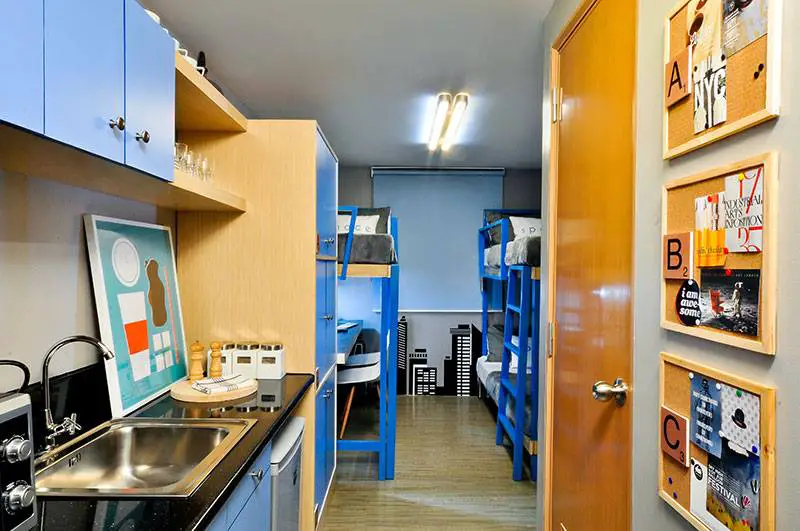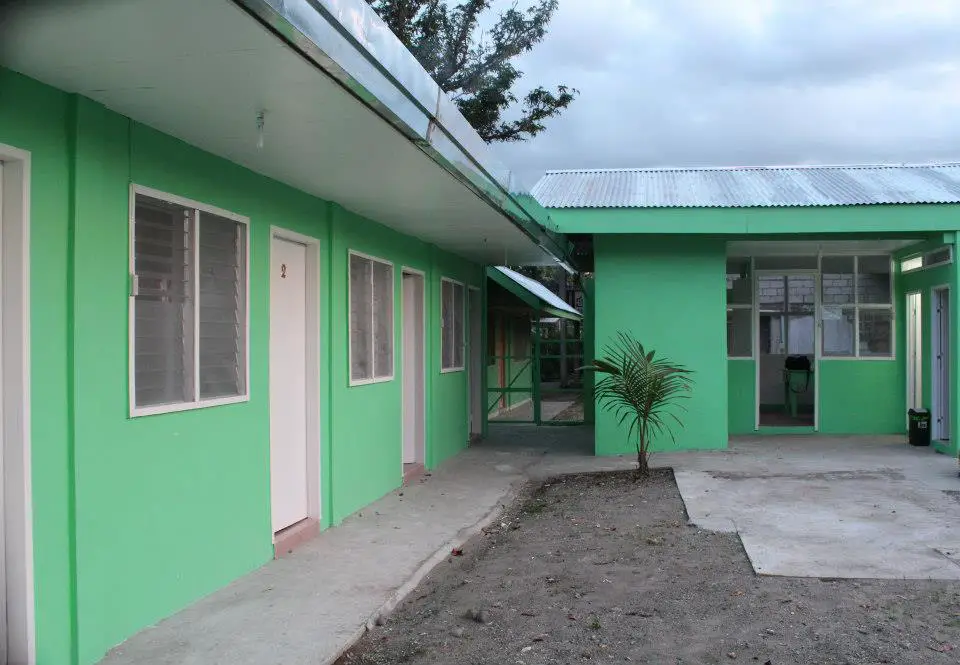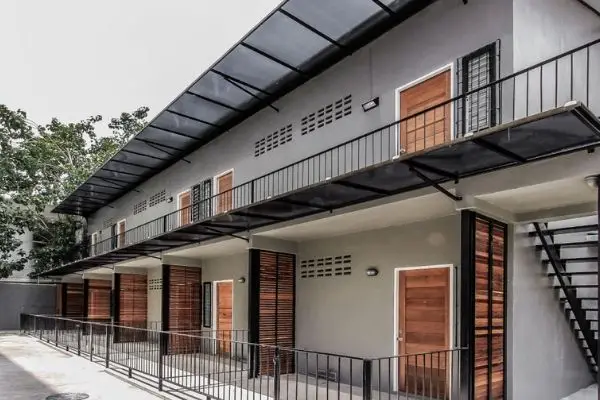As more Filipinos flock to cities to be closer to work, school, or find opportunities, demand for decent and affordable dwelling places has also grown.
That demand has become why the establishment of boarding houses has proliferated across strategic areas. This includes locations close to schools and universities, large construction sites, public transport hubs, and high-density commercial districts of the city.
Owners of properties whose location is close to the areas described above can strongly consider a dormitory business to be a profitable and sustainable model to adopt. Catering to clients who prefer low-cost, low-maintenance property with basic amenities, a boarding house business doesn’t need investment as huge as a rental apartment property.
But equally important to that enviable location is the selection of appropriate tenants. Ideal, they are the ones who receive regular income and are responsible enough to look after the property’s upkeep and well-being. On-time rental payment is crucial to sustaining profits and covering property taxes and maintenance costs.

Table of Contents
Boarding house history in the Philippines
Boarding houses have a long history in the Philippines, dating back to the Spanish colonial period. During this time, the Spanish authorities established a system of government-run boarding houses called “casas de cabildo,” which house government officials and their families.
In the early 20th century, the American colonial government established a public boarding house system to provide affordable housing for government employees and their families. This system was later expanded to include private boarding houses, which were licensed and regulated by the government.
In the post-war era, boarding houses became a popular housing option for students and young professionals. With the growing number of schools, universities, and businesses in urban areas, there was a high demand for affordable and convenient housing. Boarding houses filled this need by providing low-cost, temporary housing for students and workers who could not afford to rent an apartment or buy a home.
In recent years, boarding houses have become increasingly popular as a housing option for migrant workers and overseas Filipino workers (OFWs). Many boarding houses are located near airports and seaports, making them a convenient option for workers who need to be close to transportation hubs.
Today, boarding houses remain a popular and affordable housing option for students, workers, and travelers in the Philippines. While the industry has faced various challenges over the years, it continues to thrive due to the strong demand for low-cost, convenient housing.
Boarding house vs apartment
In the Philippines, boarding houses and apartments are both types of accommodation, but they’re different in many ways.
Boarding houses are lodging houses where tenants rent a room and share common areas like a living room, kitchen, or bathroom. Boarding houses usually have a landlord or landlady who provides meals and other services, like laundry and cleaning, for extra money. Boarding houses are a great option for students or young professionals looking for affordable and convenient housing.
On the other hand, an apartment is a self-contained unit with a living room, one or more bedrooms, a kitchen, and a bathroom. In contrast to boarding houses, apartments are usually unfurnished, and tenants have to provide their meals. Many families or single people prefer apartments because they’re more private and independent.
Why a boarding house business is a great investment
The demand for residential units will ensure that someone will always enquire about a room for rent.
Leasing your property allows you to receive recurring passive income from tenants who work or study nearby.
It may be a vacant lot next to your house or an extension of your residential unit, a boarding house can be built with less investment than a fully-furnished apartment for a family to rent.
The cost of maintenance can be minimal.
A boarding house’s operating cost can be minimized with proper care and a regular check for safety and worthiness as a dwelling place. Suppose the property is built correctly with quality materials, a well-planned design, and employs professional-grade workers. In that case, you won’t need to spend money on fixing a leaking roof, energy waste, lack of insulation, or hazards the electrical inspector could pinpoint.
You don’t need capital besides your initial investment.
Unlike the carinderia business that needs capital money to buy cooking ingredients or a sari-sari store that requires stock replenishment once depleted, a finished boarding house only requires one-off materials such as bed frames, showerheads, light bulbs, or airconditioning units. Tenants will pay for utility costs such as electricity, gas, and water. You’ll only need to worry about license renewal and property taxes and ensure your unit follows the city or municipal electrical and safety regulations.
Location, location, location
These are the most important factors in choosing a place to construct your boarding house.
If your location is near shopping malls, transport hubs, or universities, a boarding house becomes a hot prospect as tenants are willing to pay extra for the convenience they’ll enjoy.
For every prospect willing to settle on a basic, bare-bone property to offer a good place to stay, some don’t have a problem forking more money, so they’ll stay in a place that doesn’t require them to spend money on public transport or deal with the daily grind of traffic congestion.
Who are your target tenants?
1. Students or teachers. A student or teacher will likely be your tenant if you live near a school or university. Students depend on parents’ financial backing or earn on side income, and teachers draw income from employment, so there is financial stability when you choose them as tenants.
2. Entry-level workers. These workers may include those in seasonal employment, such as construction workers, or low-wage employees, such as supermarket sales staff. As their income may be relatively low, such tenants may be willing to settle in a room with a few occupants in bunk beds, allowing you, as a landlord, to maximize your available space.
3. White-collar workers. For those with more stable jobs and who can afford to pay for more privacy and comfort, a decent room with an ensuite bathroom, a small bed, and cooking facilities may be more suitable.

4. Local tourists and event delegates. They are short-term travelers who wish to visit your area for attractions or events such as seminars or conventions. While not all will consider a boarding house as opposed to standard hotel rooms, budget-conscious ones will easily pick your place over other available accommodations.
Planning your boarding house business
Assuming you have a 250 sq meter lot, and enough space to spare for an additional dwelling facility, you can spend P1 million to P1.5 million to build a boarding house that features the following:
- 6-10 rooms
- 2-3 bathrooms
- Common area
- Kitchen
It also features standard power, water, gas, and fire safety facility requirements.
The size and amenities of your boarding house business will depend on the financial power of your target tenants.
Therefore, prior research on a prospect is necessary. For example, if a nearby area has proposed constructing a large hospital building, you’ll consider accommodation for workers employed while construction is ongoing. Once the building construction is finished, a new set of prospects — nursing interns or clinic staff — will take over.
Boarding house design

- Designing a dwelling place with sufficient space, privacy, and clean surroundings makes your boarding house attractive for would-be tenants.
- Installation of shared facilities such as laundry service not only saves space but also generates extra income.
- Installation of energy-saving facilities such as solar-powered panels to help reduce utility expenses.
- A diligent approach to screening potential tenants will help create a stable, long-term relationship between fellow renters and the landlord.
Extra income: Other associated businesses
A boarding house business can also be complemented by other businesses that tenants could patronize. This includes a cafeteria business offering catering options, laundry, and dry cleaning and a sari-sari store business focusing on needs such as school supplies and Internet cafes.
Legal requirements when setting up boarding house business
There are several legal requirements for setting up a boarding house business in the Philippines because it is considered a commercial property that provides accommodation to paying guests. As such, the government has put in place regulations to ensure guests’ safety and security and protect their rights as consumers.
Business Registration
Register your business with the Department of Trade and Industry (DTI) or the Securities and Exchange Commission (SEC). This step is important to obtain a business permit and license from the local government unit (LGU).
Barangay Clearance
Obtain a barangay clearance from the Barangay Captain’s office in your business area. This is a requirement for obtaining a Mayor’s Permit.
Mayor’s Permit
Apply for a Mayor’s Permit from the LGU where your business is located. This permit allows you to operate the boarding house business and is required before you can apply for other permits and licenses.
Bureau of Fire Protection (BFP) clearance
Apply for BFP clearance to ensure your boarding house business meets the bureau’s safety and security standards. The BFP will inspect your establishment to verify that it has sufficient fire safety equipment and other safety measures.
Sanitary permit
Apply for a sanitary permit from the local health department to ensure your boarding house business meets health and sanitation standards.
Zoning Permit
Obtain a zoning permit from the city or municipality where your business is located. This permit is required to verify that the location of the boarding house business is allowed for commercial use.
Tax obligations
Register your business with the Bureau of Internal Revenue (BIR) to comply with tax obligations. This includes obtaining a Tax Identification Number (TIN) and registering for VAT, income, and business taxes.
Other legal obligations
Comply with other legal obligations such as employee benefits, social security, and insurance requirements.
To ensure that your boarding house business meets safety and security standards, you should have proper fire safety equipment, emergency exits, and first aid kits. You should also follow guidelines on electrical and building codes and sanitation and health standards.
In terms of taxes, you will need to file and pay taxes regularly, including income tax and business tax. You may also need to comply with other legal obligations such as social security and employee benefits.
Registering a boarding house business in the Philippines requires complying with the necessary permits and licenses, safety and security standards, tax obligations, and other legal obligations.
Risks associated with boarding house business
A boarding house business will engage with people with different upbringings and ways of thinking. This can be a cause of problems and risks.
Disturbance among young tenants
While students are expected to do well in school to succeed, some could quickly get in trouble with the law or perpetuate violence and crime in the vicinity. Such a cause of nuisance may be noise when involved in a drinking spree with friends or, worse, involvement in drugs and petty crime. That is why it is vital to set house rules: who are allowed and not allowed on-premises, and maintain cleanliness.
Involvement in criminal activity among those with a vague source of income
If you cannot check the background of certain tenants, you may find out later that they are involved in activities that are against the law. Some folks are willing to pay a premium for privacy, so their actions are away from the public’s prying eyes. They could be involved in extortion, drug dealing, or robbery and disappear suddenly without prior notice.
They may pay their rent regularly, but you might be more than willing to give up their spot for more deserving tenants. That is why it pays to do an adequate background check.
Risk of damage or accident
Some tenants have families with members who may damage the property or cause accidents at home. From scribble marks on the wall to the risk of fire from unattended candlelight or misuse of a cooking appliance. Accidents could happen anytime without proper guidance and safety measures, such as smoke detectors and barriers for children. Lack of care and general neglect not only causes damage but also put lives at risk.
Delinquent tenants
Last but not least are tenants who renege on an agreement to pay their rent regularly. Whether they have a hard time with their financial situation or try to evade paying the rent on time is always a cause of headaches for landlords.
Conclusion
A boarding house business can generate profits with sustained occupancy and proper maintenance. But this is also a product of serious attention to detail, market research and forecast, and leveraging that great location. While every property can adopt this business, some are more likely to succeed due to location, and a steady pool of tenants.
